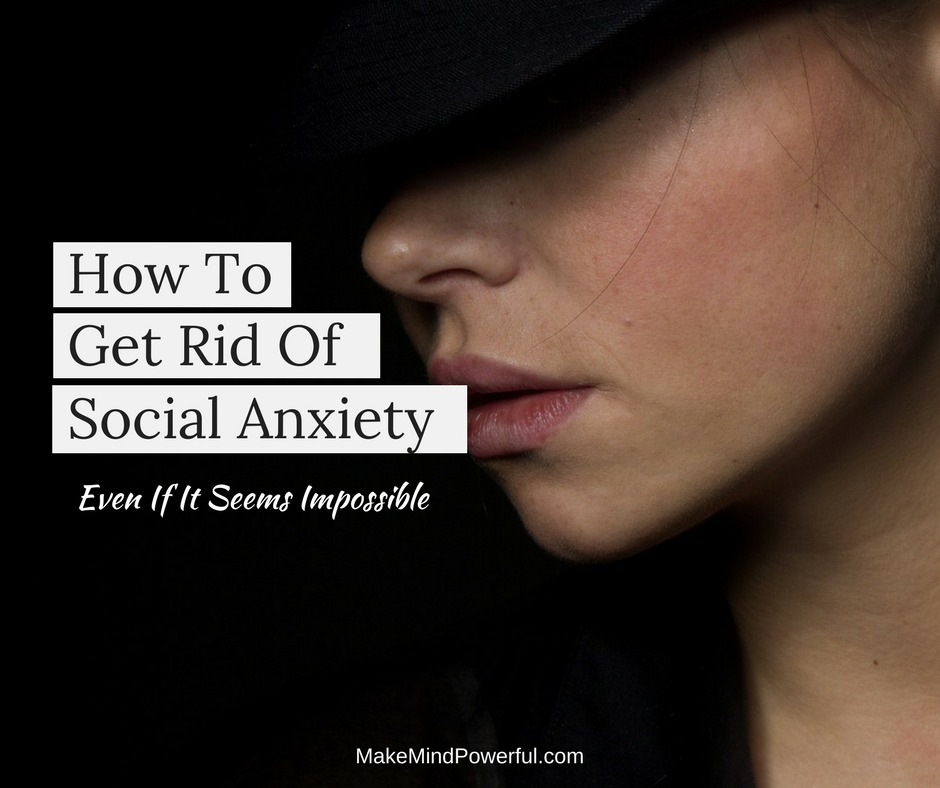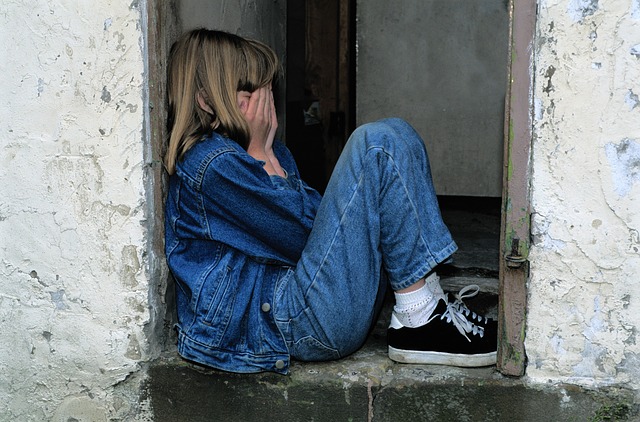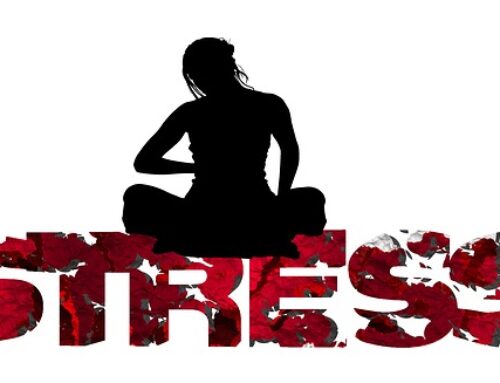Table of Contents

People who never experienced social phobia will never understand the low self-esteem that accompanies this disorder. Some would misinterpret the reluctance of social interaction as just being shy and stop short of taking any actions to get rid of social anxiety.
Therefore, I’m creating this post that addresses the various aspects of social anxiety, including a step-by-step guide to beat social anxiety.
- Social Anxiety vs Shyness
- Common Symptoms Of Social Anxiety
- Why Do You Have Social Anxiety
- How Social Anxiety Affects Your Life
- What You Can Do To Get Rid Of Social Anxiety
- Preventing A Relapse of Social Anxiety
Social Anxiety Vs Shyness
There are enough similarities between social anxiety and shyness that causes one mistaken for the other. For instance, people with social anxiety and shyness will feel nervous when talking to strangers or making new friends.
Both may experience blushing or breaking out in cold sweats when asked to attempt public speaking for the first time. In fact, there are some who jumped to an early conclusion that they have social anxiety just because they are overwhelmed by nervousness during a presentation.
While both social anxiety and shyness may share similar characteristics, here’s how they really differ.
1. Low Self-Esteem
When you’re just shy, you don’t have thoughts like “I must be sounding like a fool” when you’re trying to start a conversation. As you get familiarized to the people and places, you start to feel at home and speak more naturally.
On the other hand, people with social anxiety often fear being judged in a typical conversation. They tend to pick their words carefully and worried about the tiniest details later. The low self-esteem felt by people with social anxiety results in high level of self-conscious.
2. Avoidance
If you’re shy, you would not go to the extent of avoiding a public function or when invited to the party. You’re well aware that you’ll be in an unfamiliar setting but the thoughts of having fun making you push the shyness aside.
When you find yourself concocting lies just to get away from a social gathering, it’s much more than shyness itself. One of the common traits of social anxiety is avoidance, as you try to shy away from the panics and fear when talking to people.
3. Extreme Phobia
Social anxiety or not, many people fear public speaking more than death itself. With all the expectations and hundreds of staring eyes, it’s hard to get it right on your first attempt. If you’re merely shy, you’ll recover your composure eventually. Even if you messed it up, you wouldn’t let that it deter you from the next attempt.
Forcing a person with social anxiety to speak to a crowd can cause deep psychological trauma that could make his or her condition worse. With social anxiety, the response to fear is simply amplified, triggering the protective mechanism of the body.
Common Symptoms Of Social Anxiety
Social anxiety disorder tends to manifest itself in both physical and psychological symptoms. Some of them are pretty obvious signs of social anxiety. If you’re still having doubts about whether you’re struggling with social anxiety, here’s a few signs to take note of.
Physical Symptoms of Social Anxiety
- Blushing – It was not the type of blush when you’re trying to speak to your crush. People with social anxiety may find themselves blushing in normal conversations. Some only blushes when talking to authoritative figures. Either way, it feels humiliating for a social anxiety sufferer.
- Stuttering – Have you rehearsed what you want to say over and over again, just to end up stuttering in the actual conversation? This is a common symptom for people with social anxiety and one they often feel helpless against.
- Increased Heart Rate – When you have social anxiety, you may actually experience increased heartbeat and short of breath when you can’t avoid a social situation. You may end up wondering if there’s anything wrong with your health.
Psychological Symptoms Of Social Anxiety
The psychological symptoms of social anxiety can sometimes be mistaken for introversion. But if you’re having some of these symptoms, it is pretty obvious that you’re suffering from social anxiety disorder.
- Obsessing With Upcoming Events – It’s common to be nervous when you’re having a job interview for the first time. But if you’re obsessing over it for weeks before the interview, then it’s more than being nervous.
- You Expect Rejections – People with social anxiety have very low self-esteem and often think negatively about themselves. If you’re constantly anticipating rejection each time you asked for a favor, you have every reason to believe you’re suffering from social anxiety.
- You’re Terrified Of Attentions – There is a huge difference between not seeking for attention to actually hating or fearing it. This is a psychological symptom of social anxiety that’s often overlooked as introversion.
If you’re still trying to find out if you have social anxiety, check out other psychological symptoms here.
Why Do You Have Social Anxiety?
When your peers have no difficulty interacting with others and yet you shake with fear each time you’re in public, you couldn’t help but wonder what causes your social anxiety in the first place. Seeking the answer to this question may bring you years or decade back in time, where you’ll find a single or multiple events causes social anxiety to develop later in your life.
Here are some common causes of social anxiety that you may relate to
- Public Humiliation – Have you ever been singled for punishment in front of other students during your school days? Or suffer huge embarrassment because you messed up in your school presentations? These incidents can leave a mark on your mind and cause social anxiety.
- Sexual Abuse – Any form of sexual abuse suffered at any age can lead to the helpless feeling within victims. While the abuse is not the faults of the victims, they often experience shame and guilt. These repressed emotions often lead to fear of social interaction.
- Bullying – The truth is, bullying can leave a huge impact on your life, even if it happened in school years ago. The advice of not fighting back can often backfire, as bullies tend to pick on those who are perceived as weak and unprotected. Unfortunately, this often leads to social anxiety disorder to develop.
Here are more possible causes of social anxiety.
How Social Anxiety Affects Your Life
You’re not alone if you feel that social anxiety is messing up your life. It doesn’t matter if you’re a high school student or a working professional, you’ll have your fair share of problems associated with social anxiety.
Here’s what to expect from living with social anxiety disorder.
1. Career
You’ll find yourself geared towards jobs that require minimal interaction with others. While such jobs may seem perfect for people with social anxiety, you may still find it hard to work together with your colleagues or superior.
Often, your tendency to keep to yourself would be perceived negatively by your colleagues. When you’re ignored and isolated, you may find your workplace a lifeless place to be and would soon quit and hunt for another job. Unfortunately, this is only the start of an endless cycle, as long as you still have social anxiety.
2. Relationship
If you have social anxiety, you may have problems getting into a relationship. Low self-esteem and being painfully nervous are not really attractive points. For some, getting a couple of rejections can put an end to their further attempts to date.
However, there are people with social anxiety who have no issues in starting a relationship. But once the magical romantic period of courtship ends, maintaining a healthy relationship proves difficult, as people with social anxiety tend to keep much of their thoughts to themselves.
3. College
Unlike what you read in teenage novels, college life for people with social anxiety can be horribly lonely. Not knowing the right way to make friends, you’ll end up being the odd one out. Such isolation can only make your social anxiety worse.
While others have happy memories of their college days, you’ll want to quickly finish your study and get into the adult working life. You imagine that life would be different when you work. Except that the bitter truth is your social anxiety follows you into your job.
4. Social Life
Social life, or the lack of one, is the hallmark of social anxiety. When you have such fear of talking to people or even eating in public, you’ll find that you’re constantly left out from outings and events. You tend to make up for the lack of social interactions with books, gaming or movies.
Some would feel more comfortable chatting online and that soon become their alternative world. In the end, the lack of real human comfort may be painful when you truly need it. Some who struggled with social anxiety eventually turned to drugs and alcohol to fill the emptiness.
What You Can Do To Get Rid Of Social Anxiety
When social anxiety has been a major part of your life, it may seem impossible to get rid of it. In fact, imagining a life free of social anxiety can even seem unreal. But, the fact that I’m writing this means that it is possible to overcome social anxiety, even if it’s after years or decades.
I started to develop social phobia at 17 when I enrolled into the university. My social skills are non-existence when I started my first job. At my worst, I would stutter and break out in cold sweats when talking to strangers on the phone.
What’s worse is that I didn’t do anything about it, because I thought it was just being shy and introvert. It wasn’t until I was 34 that I managed to overcome my social anxiety, and eventually conquer the fear of public speaking.
If you’ve been suffering from social anxiety for as long as you can remember, do not lose hope. It is possible to overcome and defeat social anxiety. But it’s not an easy path. Here’s how.
1. Build Unshakable Determination
Let’s face the reality. It’s going to take an awfully long time to overcome social anxiety. Whatever changes that your brain goes through to cause it to fear social interaction didn’t happen in a couple of days. Don’t expect for shortcuts or miracle programs to help you either.
Instead, the first thing you should do is to strengthen your will to beat social anxiety. You have to believe that it’s possible to speak on the stage without freaking out even it seems impossible right now. Without a strong determination, no therapies or self-help programs could truly be effective.
Once you made beating social anxiety is not an option but a must, you’re very much closer to doing so. I started a small business when my social anxiety is at its worst. Knowing that my income depends on my ability to pitch and market, I have little choice but to overcome my fear.
2. Get Motivated
Some said that motivation does little in overcoming your social phobia. While it’s true that the feel-good factor from motivational stuff doesn’t last long, it does at least gives you the spark that you needed. After all, some motivation is better than none when you’re trying to overcome a phobia that is rooted deep within your mind.
When I tried to overcome my fear of making cold calls and networking, I read up about how successful people coped with their mental disorder and became who they are today. It helps to find yourself a role model to focus your effort on beating social anxiety.
3. Master Your Thoughts
This is not about trying to keep yourself from panicking in a presentation. It’s about training your mind to do so way before that. I’m talking about mindfulness or the ability of your mind to be impartial to its thoughts.
The common reaction for people with social anxiety when entering a room full of strangers is to feel self-conscious immediately. That follows with the fear of judgment and before long, they try to leave the venue without uttering a word.
Mindfulness allows you to choose not to react to your thoughts. It trains you not to believe in what your mind says when it’s all negative. In fact, there are scientific studies that mindfulness practice helps in overcoming anxiety. Instead of trying to challenge your negative thoughts like in Cognitive Behavioral Therapy, you remain in a neutral state.
The best way to develop mindfulness is through the practice of mindfulness meditation. But I wouldn’t recommend you to start meditating after reading a meditation guide. Instead, I suggest you use Aware, a mindfulness app that focuses on enhancing mental health.
Read what I feel about the mindfulness training in Aware.
4. Rewire Your Mind
Knowing what causes social anxiety helps in preventing a relapse, but it doesn’t do much in overcoming it. When you shape a Play-Doh to the shape of a rectangle, it remains so after you removed your hand from it. The same happens to your mind, years after the events are forgotten.
The good news is, science has proven that it is possible to rebuild your neural network, or how your brain cells are connected through a phenomenon called neuroplasticity. In this case, self-help courses with the element of hypnosis work the best for me.
The turning point in my battle against depression and social anxiety is through a program called Unlimited Abundance by Christie Marie Sheldon. It uses a form of hypnotic visualization to help me uncover my limiting beliefs and remove it from my subconscious mind.
This program, while does wonder to my mind, is not meant for overcoming social anxiety. I eventually found this hypnosis audio for social anxiety created by professional hypnotherapist during my relapse. Not only it is effective but it cost a fraction of the previous program.
5. Build Your Self-Esteem
Low self-esteem is a common symptom of social anxiety disorder. But when you start to build your self-esteem, you’ll find that you have a lesser fear of being judged, nor do you feel unworthy when interacting with others.
Building self-esteem can be surprisingly simple, but you need to avoid these habits first.
You can start by working out for your health and physical appearance. It’s not about being vain or having six-packs. But having a great physical health naturally improves your mental health. Besides, a fitter body does increase your confidence.
If you’re a perfectionist, you need to start learning about the beauty of imperfection. Constant demand of being perfect can cause feelings of being inadequate. That often results in hurting your self-esteem.
Check out more effective ways of building your self-esteem here.
6. Take Some Little Steps Or A Big One
All the motivations and mind training will be pointless if you do not take actions to face your fear. To truly overcome social anxiety, you need to do what you once dreaded. It doesn’t matter if it’s a public speaking or making a phone call, but you must work your way to that.
Some people believe in taking little steps to overcome their fear. For me, I believe in taking the massive plunge, just like my first public speaking attempt. Either way, you need to practice before you do attempt the actual scenario.
It is normal to still feel nervous but if you did your mind training well, you will have a strong belief that you wouldn’t be terrified regardless of how it goes. Chances are, you will actually do well in situations that once triggered traumatic emotions.
This may sound unbelievable but once I shook off my social anxiety, I actually enjoyed being on the stage when I’m hosting events. In fact, I actually crave attention when the situations allow so. You’ll discover surprising personalities when you too, overcome your social anxiety.
Preventing A Relapse of Social Anxiety
The bad news is, you can have a relapse of social anxiety if you’re not being careful of your lifestyle after you overcome it. My relapse happens because of my isolated working environment, where I have limited human interaction.
The great news is, once you’ve overcome social anxiety the first time, beating it the second time is much easier. You just have to stick to techniques that work for you and you’ll manage to recover from the relapse.
I hope you’ll find my experience useful in your own battle against social anxiety or if you’re trying to help someone else to do so. Feel free to share this out if you feel it could make a positive difference in someone’s life.
Do you suffer from social anxiety? What have you tried to overcome social anxiety? Share your best tips with us in the comment below.
Related:
- How To Meditate Deeply When You Are Feeling Anxious
- How People With Social Anxiety Can Be More Confident In A Relationship
- 7 Self Limiting Beliefs That Cripple Your Self Esteem Subconsciously
- 7 Signs You Are Beating Social Anxiety Just By Doing The Right Thing
- 11 Best Jobs For People With Social Anxiety Disorder
- How To Prevent Blushing When Speaking Up To Authoritative Figures
- Hypnosis For Social Anxiety – Does It Really Work?









Leave A Comment